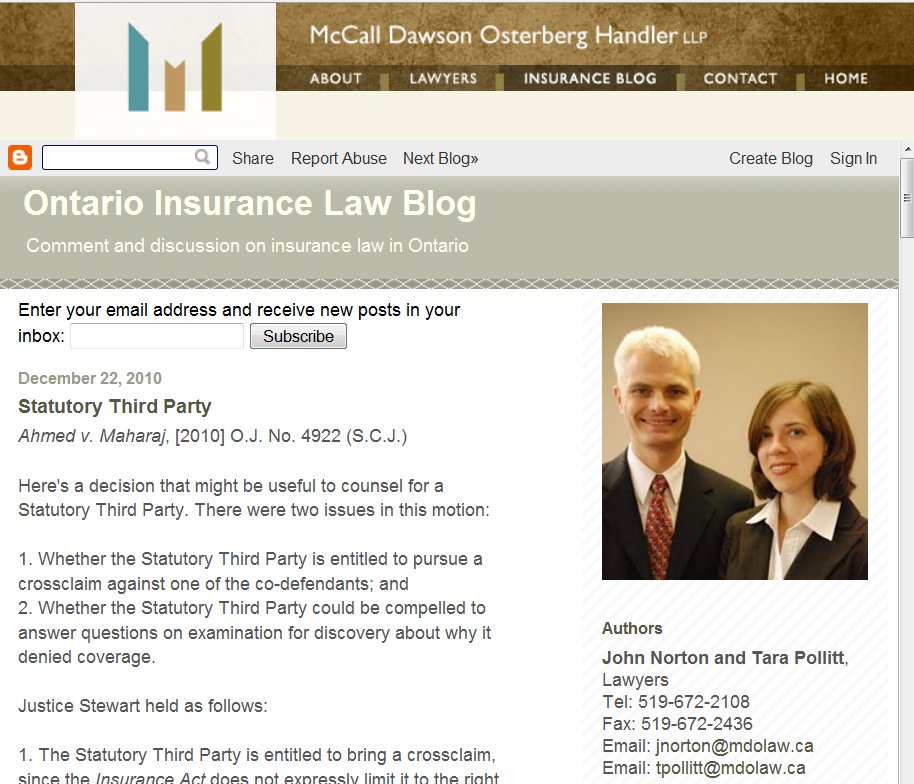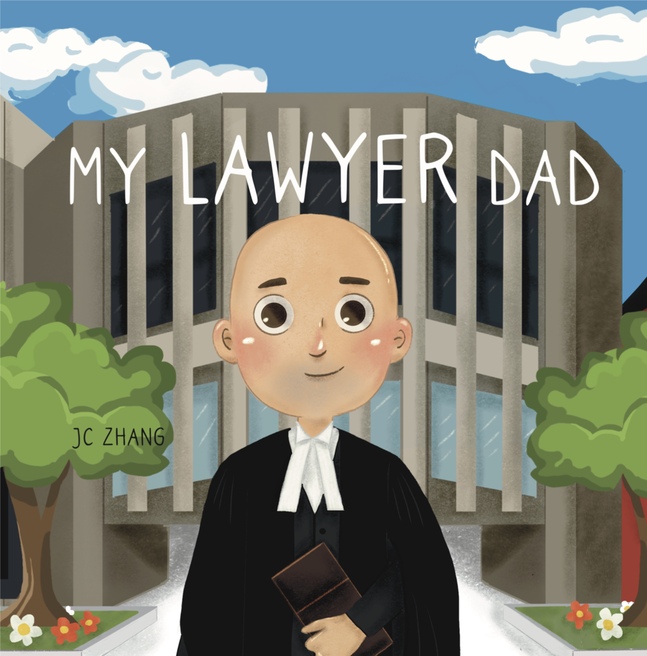2010 CLawBies Nominations
It’s time for the 2010 CLawBie Awards, sponsored by Stem Legal, Dye & Durham, Clio, and Lexblog.
Before getting into my nominations it’s worth repeating that if you share a blog with me, you can be found in a video with me somewhere, or if I’ve nominated you before, I’m automatically excluding you. Most of you already have nominations by other bloggers and will be in the running.
Instead, I’m going to focus on some of the newer sites to the Canadian blogosphere to help welcome them to the existing community, and hopefully provide some suggestions as to how to make their sites even better.
Prelude
I was recently reading Mark Herrmann‘s series on Above the Law, where he asks,
Is blogging a useful business development tool?
Almost everyone I’ve ever encountered in the public relations industry years before law seem to think it has worked for them. And public relations professionals are miles ahead of lawyers when it comes to business development.
Although Hermann points to several benefits he gained from blogging over the years, including influencing the law, a book deal, and raising his profile, he didn’t directly gain any clients from the blog. Personally I expect that he wouldn’t, but all the other opportunities stemming from blogging help form more of the complete package as to why someone selects a lawyer as their counsel.
Even though I’ve been blogging about legal subjects for about three and a half years now, just before I started law school, I didn’t set out with business development as my primary goal. It’s been fun, a great way to exchange ideas and get to know more senior members of the bar.
As my own call to the bar approaches, and demands of my time from employers compete with nearly every other activity in my life, some prioritization and perhaps greater focus is likely in order. I’ll still continue to write about a wide variety of legal subjects in areas that I do not practice out of my own interest. But I’m also actively looking for content more closely related to my practice, which is what the following nominations will reflect.
The Nominations
 1) The Ontario Rules of Civil Procedure blog by Jeremy Millard and Tiffany Soucy of Fraser Milner Casgrain LLC. The new Rules are intended to promote settlement and streamline the litigation process in Ontario, but there are a still many questions that remained unanswered.
1) The Ontario Rules of Civil Procedure blog by Jeremy Millard and Tiffany Soucy of Fraser Milner Casgrain LLC. The new Rules are intended to promote settlement and streamline the litigation process in Ontario, but there are a still many questions that remained unanswered.
For example, does anyone know how subrule 20.05(2)(k) works? If so, please contact me and let me know, because even these seasoned litigators don’t have a clue. The FMC blog summarizes case decisions relating to the interpretation of the new Rules, and it’s one of my regular stops as I’m frequently tasked with figuring them out.
One of the greatest limitations is that it’s limited to case law, so we don’t have insight or guidance from secondary sources or interviews that could potentially sort out some of these issues for us.I’m also not a fan of their subscription service, which is limited to email. I get enough emails as it is, thank you very much. I was able to find the RSS feed and add it to my reader because I know where to look for it, but they should feature this more prominently on the site.
It’s still a great resource for those practicing litigation, and it’s also promising to see larger law firms dedicating resources to projects like this.
2) Herrmann conclusion in the post referenced above is as follows,
Whether blogging makes sense as a business development tool depends on your particular situation. Firms specializing in personal bankruptcy buy advertising space on billboards and time on television. Maybe a good personal bankruptcy blog would be a business magnet. So, too, for plaintiffs’ personal injury work, which seems analogous from a business development perspective. Eric Turkewitz, for example, writes a solid blog in the personal injury field; maybe he can tell us if it’s landed him any business.
After appearing for trial scheduling at the Superior Court of Justice from Hamilton to Oshawa and several courts in between I can conclude pretty definitively that the best area of law to gain civil trial experience is in personal injury. These files simply dominate the civil docket in any court in the province that I visit. No surprise then that I’m finding this as my primary area of practice, especially given my health care background. As this area of law is also ripe for business development through blogs, we should theoretically see much more personal injury sites.
The legal blogosphere is still emerging in Canada, so it’s still relatively easy to make an impression in a niche area for the dedicated practitioner. Erik Magraken of the MacIsaac Group launched the BC Injury Law and ICBC Claims Blog in 2008, and was a recipient of the 2009 CLawBie for Best Practitioner Blog. Still, I feel his site is worthy of a nomination this year from me because he has really shown what can be done on blogs for this area of law.
The statutory regime in B.C. is completely different in Ontario, and I cannot even pretend familiarity with the Insurance Corporation of British Columbia. But I do rely on B.C. case law all the time, and my first stop in interpreting these cases in the past year has been Erik’s site.
One thing I’ve been pleased with as the site has evolved is the increase use of graphics and videos, which really adds to the flavour. The Odiogo text-to-speech feature is especially considerate of a readership that could be visually-impaired, something I might incorporate myself down the road.
I’m not sure if Erik is scanning some of these pictures, but some of the graphics are pretty low resolution, or at least difficult to read. Although high resolution is certainly not needed for websites, when an image contains text it should ideally be crisp and readable, or at least have the option of increase the image size for greater scrutiny, especially when trying to read these images on a mobile phone (I do this a lot these days).
My one suggestion for Erik’s site would be to use screenshots instead of scanning text books, or find a way to make the images more crisp.
3) My final nomination is the Ontario Insurance Law Blog by John Norton and Tara Pollitt of McCall Dawson Osterberg Handler LLP. (By way of disclosure, I did work with Tara at Legate & Associates while I was in law school).
This site, which is also focused on case law, comes up consistently when I’m doing research in the area as well. I don’t receive the Ontario Reports until I’m called to the bar, so having these short updates on hand is incredibly useful.
It’s hosted on Blogspot, which is common enough for those starting out with blogging, although certainly not my preference. But it’s also embedded on the firm’s website, which I find rather redundant. Host it on Blogspot, or host it on the firm site itself, preferably the latter. But don’t do both, it just doesn’t look good.
Postlude
There are many other blogs that I could mention, but I’m going to try to stick to the CLawBies rules and limit it to three nominations.
Here’s a list of other bloggers who have made nominations this year:
I am pleased to see Law is Cool has been nominated again this year, and with my name in conjunction, but the reality is that it always has been a team effort and my role on the site has diminished significantly since joining Slaw. Although mentioning your own site(s) is generally a faux pas for CLawBie nominations, in this case I’m really just clarifying my role to share the accolades with others who are much more deserving.
Given my review of sites above and related commentary, I’ll have to write more on these subjects in the coming years. More importantly, my greatest hope is that blogging continues to be an activity engaged in primarily for the fun of it and the adventure of unexplored opportunities, rather than for some elusive business development goals. Let’s hope others in Canada see it the same way too.




[…] This post was mentioned on Twitter by Garry J. Wise and Garry J. Wise. Garry J. Wise said: 2010 CLawBies Nominations http://is.gd/jBIEL […]